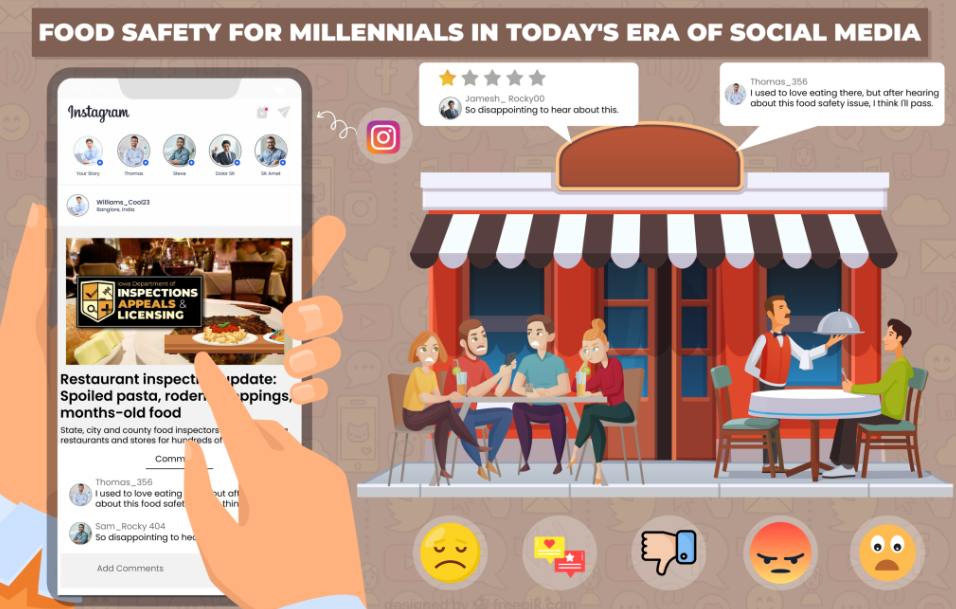
Within today’s digital realm, social media platforms have become seamlessly woven into the fabric of our everyday existence, shaping how we communicate, share information, and make purchasing decisions.
Millennials, born between the early 1980s and the late 1990s, form a demographic group known for their enhanced education and technological proficiency compared to preceding generations. Their utilization of social media platforms like Instagram, TikTok, and YouTube has revolutionized their approach to ensuring food safety and influencing food choices and consumption habits. However, amidst the allure of mouth-watering food photos and trendy food hacks, the importance of food safety cannot be overlooked.
Exploring and understanding the intersection of food safety and social media for millennials can demonstrate the essential tips for navigating food safety in the digital age.
Food safety has always been a paramount concern for consumers, but with the rise of social media and the influence of millennial culture, perceptions and behaviors regarding food safety have undergone significant shifts. Millennials have a tendency to rely heavily on social media platforms for information, recommendations, and social validation.
Choice of Food Service Establishments
Millennials exhibit distinct preferences when selecting food service establishments, often influenced by social media content. Social media platforms like Instagram and Yelp play a crucial role in shaping their perceptions of restaurants and food vendors, with visually appealing images, user reviews, and influencer endorsements impacting their decisions.
Food-Related Behavioral Changes
Increased awareness of foodborne illnesses, food recalls, and contamination incidents prompts millennials to adopt more cautious approaches to food consumption. This includes scrutinizing expiration dates, adhering to proper food storage guidelines, and demanding higher accountability from food producers and distributors. Moreover, the fear of encountering contaminated food has driven many millennials to embrace home cooking as a safer alternative, further impacting their dining habits.
Consumer Education & Awareness
Social media serves as a powerful educational tool for millennials, fostering a culture of awareness and advocacy around food safety issues. Through platforms like YouTube and Facebook, millennials access a wealth of content ranging from cooking tutorials to informative videos on food safety practices. This accessibility to information empowers millennials to make informed choices about their food consumption, encouraging them to seek out reputable sources, question marketing claims, and engage in conversations about food safety within their social networks.
Safer Food Ingredient Practices
Millennials are driving a paradigm shift in food ingredient practices through their vocal advocacy for cleaner, more sustainable food options. Social media campaigns and online petitions amplify their concerns regarding the use of artificial additives, pesticides, and genetically modified organisms (GMOs) in food production. The rise of food bloggers and influencers championing health-conscious eating habits further reinforces the importance of safer food ingredient practices among millennials.
Moving forward, stakeholders in the food sector must recognize and adapt to these evolving consumer preferences to maintain trust and relevance among millennial consumers.
Misinformation and Pseudoscience
Social media platforms are breeding grounds for misinformation and pseudoscience, including myths and misconceptions about food safety. From trendy diets to unfounded health claims, millennials are inundated with conflicting information that may not always be evidence-based or scientifically accurate.
Influencer Endorsements and Product Safety
While influencer endorsements can drive sales and brand awareness, they also raise questions about product safety and transparency. Millennials may be swayed by influencers to try new food products without fully considering factors such as ingredient sourcing, manufacturing practices, and food safety standards.
Risky Practices Linked to DIY Food Trends
DIY food trends and cooking hacks popularized on social media may encourage millennials to experiment with unconventional cooking methods or ingredients. While creativity is encouraged, some DIY food practices may pose food safety risks if not conducted safely or if proper hygiene and sanitation practices are not followed.
Food Safety of Viral Food Ingredients
While social media food patterns might captivate the eye and be deemed worthy of Instagram posts, they can simultaneously pose hurdles to maintaining food safety. Safeguarding the safety and quality of new trending ingredients can evolve into a logistical challenge. Eateries must harmonize catering to customer preferences with upholding food safety standards, frequently necessitating swift adjustments to their menus and procurement strategies.
Pressure on Food Establishments to Perform
The relentless scrutiny of social media puts restaurants under intense pressure to excel. This pressure often creates stressful environments in kitchens, ironically increasing the risk of food safety lapses. This challenge particularly impacts millennials, who are both avid users of social media and frequent patrons of restaurants, highlighting the importance of addressing these issues for this demographic’s well-being.
Despite the challenges, millennials can take proactive steps to prioritize food safety while navigating the world of social media. Here are some essential tips to keep in mind:
Critical Thinking and Fact-Checking
Research Brands and Products
Practice Safe Food Handling and Preparation
Engage Responsibly with Influencer Content
Stay Knowledgeable of Food Enterprise Measures
While social media platforms offer endless inspiration and opportunities for culinary exploration, millennials need to prioritize gaining the right food safety knowledge to ensure safe and high-quality food consumption through appropriate means as facilitated by food manufacturers or the food service sector. This is where it becomes paramount for food industries to take into account how to optimize their operations to facilitate this phenomenon and equip their businesses with adequate resources and tools to stay at the forefront of guiding millennials in maneuvering food safety amidst the influence of social media.
Smart Food Safe: Equipping Food Supply Chains to Keep Pace with Food Safety Trends
Smart Food Safe emerges as a well-rounded software solution for elevating the efficiency of Quality, Food Safety, Regulatory, and Traceability management throughout the food supply chains. Our set of state-of-the-art digital modules presents innovative functionalities to make it easy for food businesses to streamline their processes according to the ever-evolving habits and demands of consumers, ultimately sustaining relevance for the future.
_1.png)